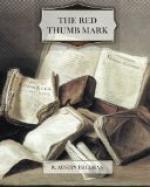“You regarded him as a man of irreproachable character. Is that so?”
“That is so; and my opinion of him is unchanged.”
“Has he, to your knowledge, any expensive or extravagant habits?”
“No. His habits are simple and rather thrifty.”
“Have you ever known him to bet, gamble, or speculate?”
“Never.”
“Has he ever seemed to be in want of money?”
“No. He has a small private income, apart from his salary, which I know he does not spend, since I have occasionally employed my broker to invest his savings.”
“Apart from the thumb-print which was found in the safe, are you aware of any circumstances that would lead you to suspect the prisoner of having stolen the diamonds?”
“None whatever.”
Mr. Anstey sat down, and as Mr. Hornby left the witness-box, mopping the perspiration from his forehead, the next witness was called.
“Inspector Sanderson!”
The dapper police officer stepped briskly into the box, and having been duly sworn, faced the prosecuting counsel with the air of a man who was prepared for any contingency.
“Do you remember,” said Sir Hector, after the usual preliminaries had been gone through, “what occurred on the morning of the tenth of March?”
“Yes. A note was handed to me at the station at 10.23 a.m. It was from Mr. John Hornby, and stated that a robbery had occurred at his premises in St. Mary Axe. I went to the premises and arrived there at 10.31 a.m. There I saw the prosecutor, Mr. John Hornby, who told me that a parcel of diamonds had been stolen from the safe. At his request I examined the safe. There were no signs of its having been forced open; the locks seemed to be quite uninjured and in good order. Inside the safe, on the bottom, I found two good-sized drops of blood, and a slip of paper with pencil-writing on it. The paper bore two blood-smears and a print of a human thumb in blood.”
“Is this the paper?” asked the counsel, passing a small slip across to the witness.
“Yes,” replied the inspector, after a brief glance at the document.
“What did you do next?” “I sent a message to Scotland Yard acquainting the Chief of the Criminal Investigation Department with the facts, and then went back to the station. I had no further connection with the case.”
Sir Hector sat down, and the judge glanced at Anstey.
“You tell us,” said the latter, rising, “that you observed two good-sized drops of blood on the bottom of the safe. Did you notice the condition of the blood, whether moist or dry?”
“The blood looked moist, but I did not touch it. I left it undisturbed for the detective officers to examine.”
The next witness called was Sergeant Bates, of the Criminal Investigation Department. He stepped into the box with the same ready, business-like air as the other officer, and, having been sworn, proceeded to give his evidence with a fluency that suggested careful preparation, holding an open notebook in his hand but making no references to it.




